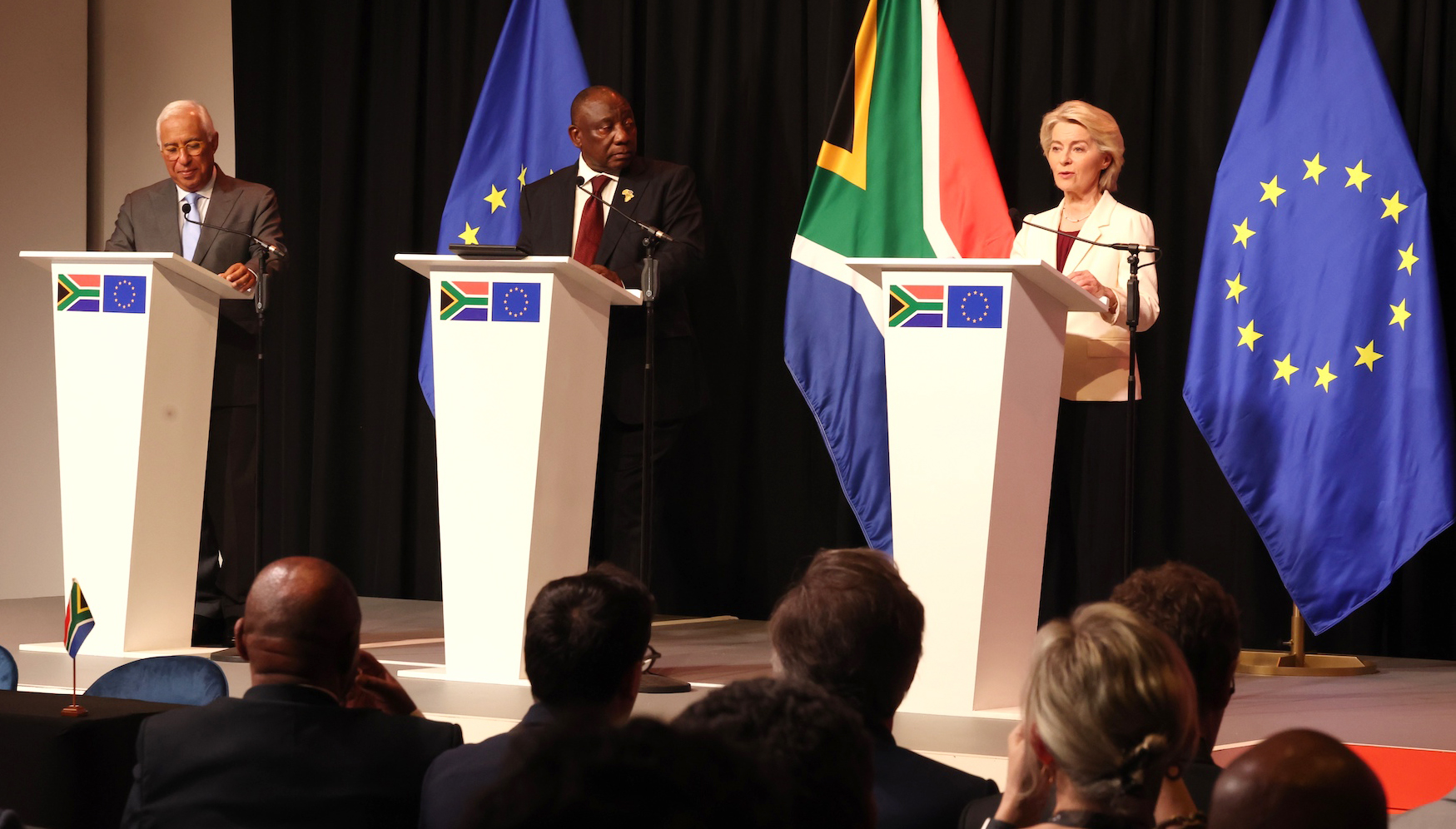The European Union has announced €750-million in new investments to modernise South Africa’s transport and energy infrastructure, jointly manufacture batteries for electric vehicles, and increase production of vaccines and other pharmaceuticals in South Africa.
The EU and SA also signed a landmark “Clean Trade and Investment Partnership” agreement and an agreement to jointly develop SA’s critical minerals while ensuring that the processing would be done in SA.
Ursula von der Leyen, president of the EU Commission, and António Costa, president of the EU Council, announced the new investments at a press conference with President Cyril Ramaphosa in Johannesburg on Thursday, 20 November 2025.
Von der Leyen and Costa had just had an official meeting with Ramaphosa to monitor progress on the agreements they made at the SA-EU summit in Cape Town in March. The EU leaders also travelled to SA to attend this weekend’s G20 summit.
Read more: ‘We are here to stay’ — EU investment in SA soars as ties with Trump’s US shrink
Green transition and critical minerals
Von der Leyen said that with the new projects, the EU was delivering on the almost €12-billion Global Gateway investment package, which it promised to Ramaphosa at the recent Global Gateway Forum in Brussels.
Von der Leyen said firstly that the EU and the European Investment Bank would invest €350-million to support Transnet to modernise and decarbonise its rail, port and pipeline infrastructure.
The EU would also invest about €330-million in green hydrogen and e-batteries, and sustainable critical raw materials value chains. The package would be mobilised in close partnership with KfW and GIZ, Germany’s development bank and cooperation agency.
The EU is also investing €70-million in SA’s pharmaceutical and vaccine production, building on Europe’s existing €700-million support.
/file/attachments/2984/IMG_20251120_182720_315030_b460b391564a00e3dfb76e8dfa4bf990.jpg)
The Clean Trade and Investment Partnership, the first of its kind, which the EU and SA signed after long negotiations, is designed to drive mutually beneficial trade, investment and job creation while supporting decarbonisation and clean supply chains.
“This new type of cooperation will strengthen the EU’s position as a partner of choice for countries committed to the clean transition,” the EU said.
The Memorandum of Understanding on critical minerals that the EU and South Africa signed creates a partnership on developing sustainable minerals and metals value chains, following similar agreements the EU has signed with Zambia, the Democratic Republic of Congo and Namibia.
It aims to develop joint industrial projects for exploring, extracting, refining and recycling minerals and metals and integrating value chains.
Read more: SA’s G20 drive for Africa to benefit from critical minerals must not try to compete with China
‘Very productive meetings’
Ramaphosa said that through the agreements, “We have prioritised the transition to green energy, ensuring that this process is just and inclusive, but more importantly also safeguards the livelihoods of those who are most affected by the transition.”
Ramaphosa called the critical mineral agreement “unprecedented” because SA had never before signed an agreement “where two partners agree that they are no longer going to rely on extractive minerals only. We will want to extract those minerals, have them processed at the point of extraction, add value to those minerals, so that South Africa begins to move up the value chain of their beneficiation.
“These two agreements will strengthen our trade and investment ties. They will provide a platform for regulatory cooperation and identification of strategic projects, especially in green hydrogen, clean technology and critical minerals.”
/file/attachments/2984/IMG_20251120_190056_219174.jpg)
He noted that he had met Von der Leyen four times this year — in Cape Town, the UN in New York, in Brussels and now in Johannesburg — as SA-EU relations continued to strengthen.
“And all those meetings that we have had have been very productive.”
He added that more joint projects were being negotiated, such as on producing sustainable aviation fuel, electric vehicles and hybrid vehicles in SA for export to the European market.
He also expressed confidence that the EU and SA would reach agreement over their dispute on citrus exports to the EU. SA has taken the EU to the World Trade Organization over the measures it has adopted to control pests on citrus that SA believes add unjustifiable costs to its products.
Read more: SA feels the squeeze in dispute with WTO over citrus regulatory measures
G20 support
Ramaphosa also thanked the EU for its full support of SA’s G20 agenda, and said: “This is a mature relationship that is predictable, that is reliable, and that is based on trust.”
The implicit contrast with the US was evident as SA continues to endure attacks from President Donald Trump and has just entered a spat with the US over whether or not its acting ambassador — or Chargé d’Affaires — can briefly attend a handover ceremony during the closing of the G20 summit on Sunday to officially receive the G20 Presidency from SA.
Ramaphosa’s spokesperson, Vincent Magwenya, told Daily Maverick: “The president will not hand over to a Chargé d’Affaires. It’s a breach of protocol. No head of state and government anywhere in the world will do it, and it won’t start here in South Africa.”
Read more: Ramaphosa declines US request for acting ambassador to receive G20 presidency in Johannesburg
Von der Leyen said at the press conference with Ramaphosa that “2025 has already been a landmark year for EU-South Africa relations, and today we are taking it even further by signing the first ever Clean Trade and Investment Partnership.
/file/attachments/2984/IMG_20251120_190030_891040_5478f47070809bd3b8376e4094aa59b0.jpg)
“This new, dynamic form of trade agreement brings together competitiveness and climate action. We are stepping up mutually beneficial cooperation in the clean economy and on critical raw materials.”
She added that she and Ramaphosa would on Friday host the final pledging event of the “Scaling Up Renewables for Africa” campaign to help power a clean future for the continent.
The campaign, launched at last year’s Rio G20 summit, aims to mobilise financing for clean energy, electrification and clean cooking solutions across the continent.
In a joint statement, Ramaphosa, Von der Leyen and Costa also said their meeting was taking place against the backdrop of growing challenges to multilateralism and the ongoing conflict in Sudan. They reiterated their March commitment “to a just, comprehensive and lasting peace in Ukraine and in the occupied Palestinian Territories” and recalled the importance of multilateralism. DM





 President Cyril Ramaphosa, centre, welcomes Ursula von der Leyen, president of the EU Commission, right, and António Costa, president of the European Council, at the Sandton Convention Centre in Johannesburg. (Photo: Siyabulela Duda / GCIS)
President Cyril Ramaphosa, centre, welcomes Ursula von der Leyen, president of the EU Commission, right, and António Costa, president of the European Council, at the Sandton Convention Centre in Johannesburg. (Photo: Siyabulela Duda / GCIS)